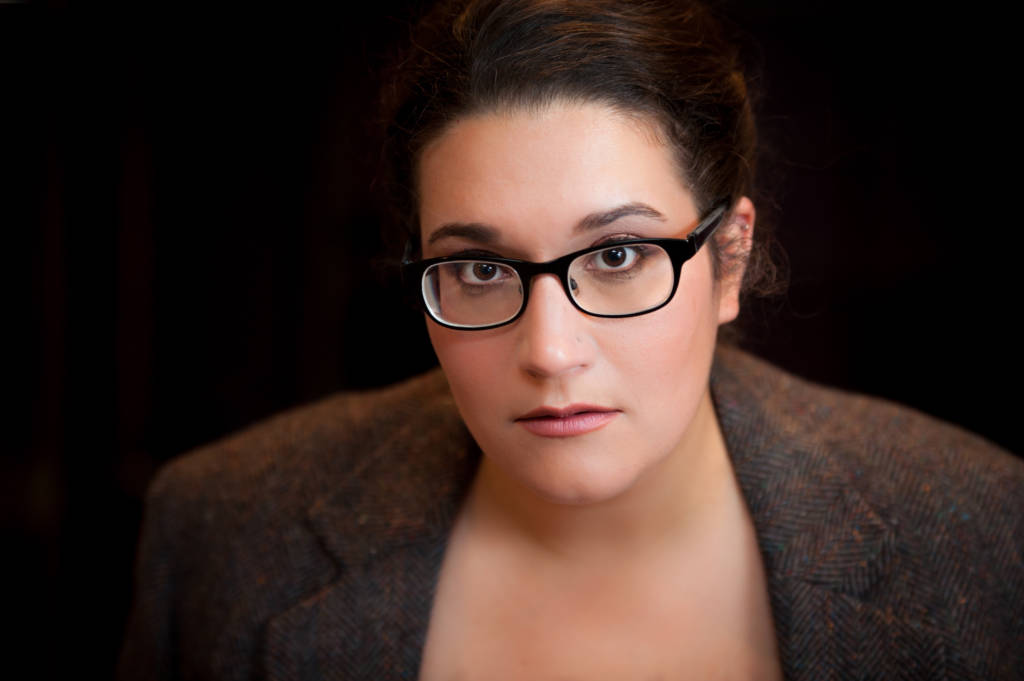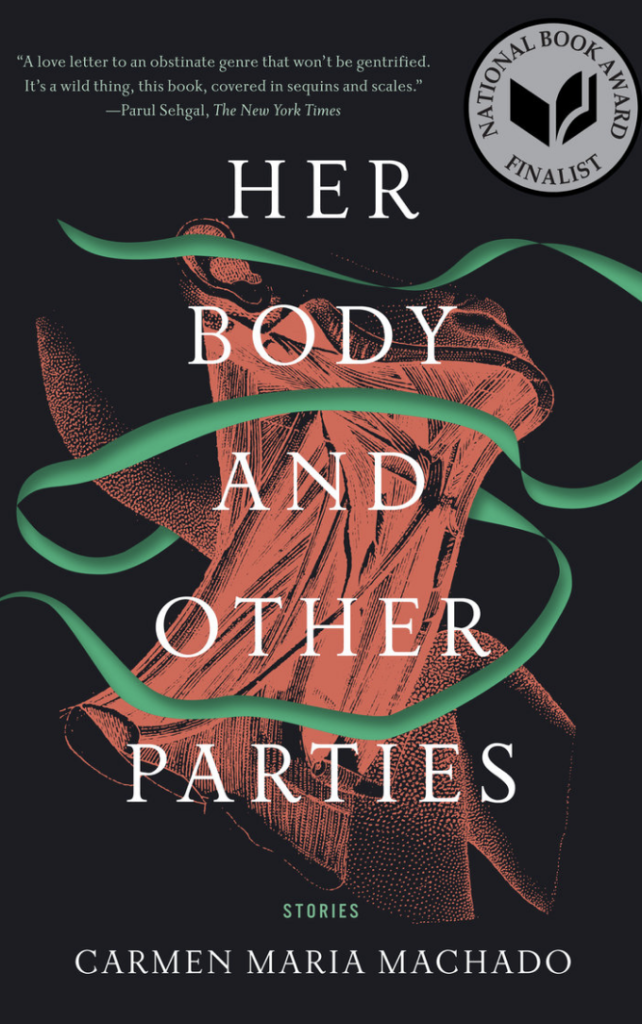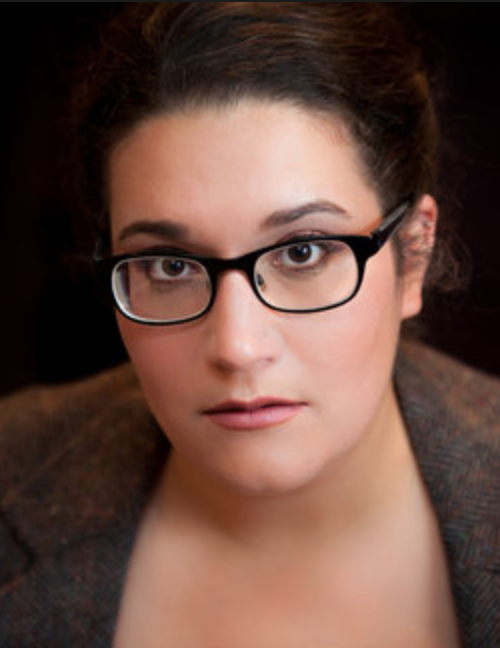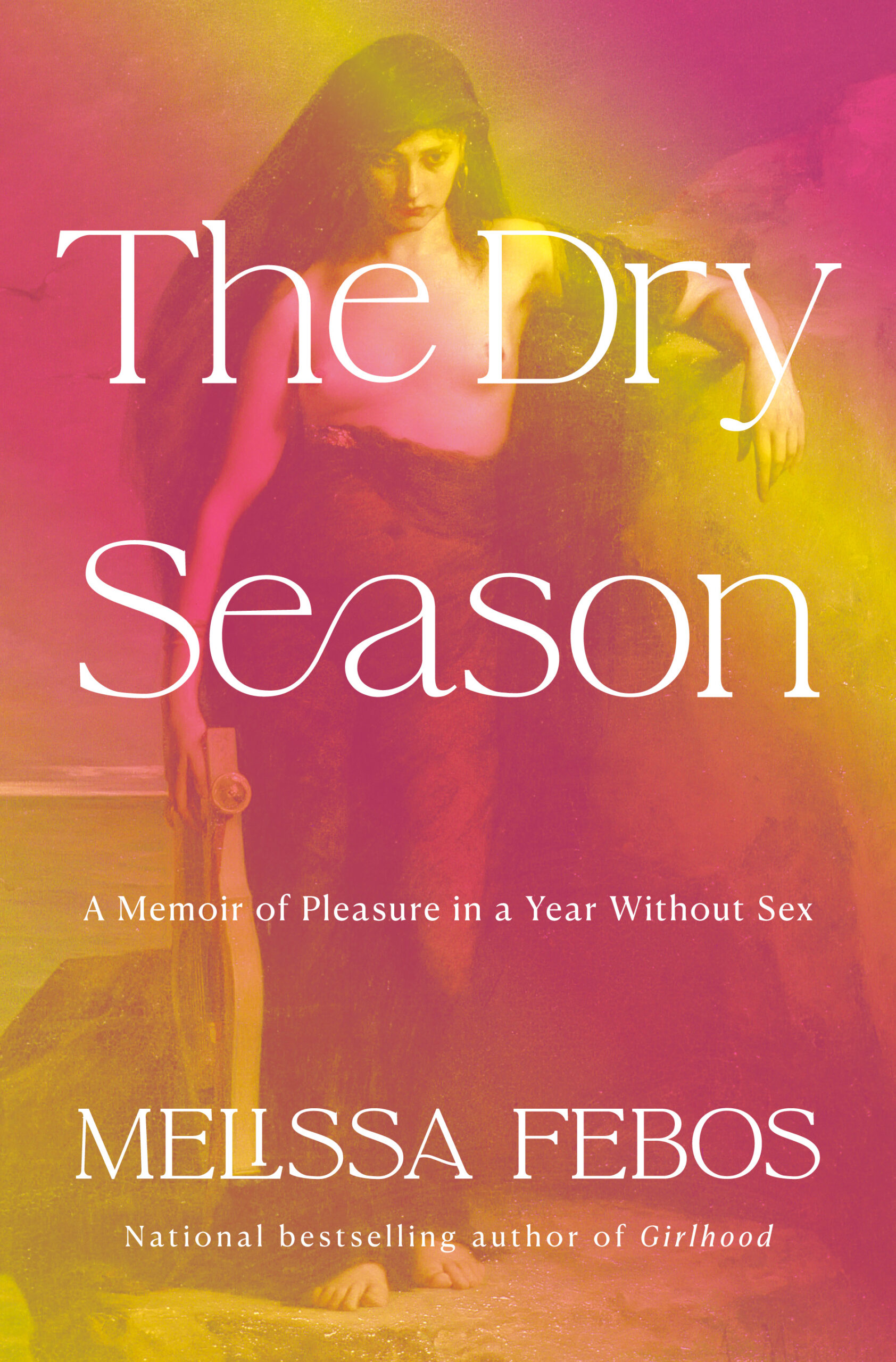HILARY LEICHTER interviews CARMEN MARIA MACHADO

Carmen Maria Machado’s debut short story collection, Her Body and Other Parties, was a finalist for the 2017 National Book Award, the Kirkus Prize, and the PEN/Robert W. Bingham Prize for Debut Fiction, and the winner of the Bard Fiction Prize and the National Book Critics Circle’s John Leonard Prize. She holds an MFA from the Iowa Writers’ Workshop and has been awarded numerous fellowships and residencies from organizations that include the Michener-Copernicus Foundation, the Yaddo Corporation, Hedgebrook, and the Millay Colony for the Arts. Her memoir, House in Indiana, is forthcoming in 2019 from Graywolf Press. Carmen Maria Machado will be at Amherst College on March 1st at 7:30 for a National Book Awards on Campus Conversation, which is a part of LitFest 2018.
This summer Hilary Leichter met with Machado at her home in Philadelphia, where Machado is the Writer in Residence at the University of Pennsylvania.
*
Hilary Leichter (HL): Since we’re in your home, I thought we could talk a little bit about where you write. Do you work here?
Carmen Maria Machado (CMM): I write all over the place, but I get my most work done at residencies. I think it’s because when I’m at home I’m thinking, “Oh, the garbage has to go out.” There’s always something else you can be doing at home, fussing around, and when I go to residency all of that is taken care of. I’m also very productive when I have large swaths of time in front of me. I need time to stretch and move. I don’t like to feel constrained.
I do write at home sometimes. I’ll write in my office, or on the front porch. There’s a table out there and I really like it. Right now it’s mosquito season, and I was out answering emails all morning, and my legs are so bitten up. I love being outside, but the bugs love me more. My dream one day is to have a home with a big, outdoor space and a mesh screen.
HL: Many of your stories have very surreal environments. Specifically “Inventory”—we’re seeing a wasteland as it’s in the process of becoming a wasteland. Does traveling to a new space influence the uncanny aspects of your fiction?
CMM: I think there’s something about being in a new space—especially a natural settings that’s new to me—that’s helpful for the sense of disassociation or the uncanny. I did a residency last year called Playa, which is in eastern Oregon. That landscape is super alien, at least it is to me. I don’t live in the desert. There’s this crazy dried-up lake, and dust devils, and a lot of intensive wildlife action. There’s a lot happening in the landscape that’s very surreal if you’re not used to it. Then I went to Hedgebrook, this beautiful residency in the Pacific Northwest. There were these massive banana slugs. They’d come out and you’d have to walk so carefully, otherwise you’d step on them. They were so big, and colorful, and they’d be frothing and undulating in the paths. And I was just at Headlands in Marin, and it was all fog. Very creepy. The fog was sort of physical, you could see it coming, and then it would come, and it would overwhelm everything.
Sometimes a new space directly influences my work. I was finishing up my story “The Resident” at Playa. In the story, a rabbit that used to be a squirrel gets ripped in half. When I was at Playa, I walked back to my cabin one night with a flashlight and there was a rabbit that was ripped in half on my front step. I was like, “Well that’s fucking terrifying!” But it was also kind of beautiful. Really surreal. Even if the landscape doesn’t directly influence my stories, there’s something about that sense of dislocation or defamiliarization that allows me to see a space with new eyes.
[The same was true] when I went to Yaddo—that landscape is very familiar to me, but I don’t spend a lot of time in nature. I’m not a camper or a hiker, so there’s something about proximity to nature where intellectually it’s familiar to me, but aesthetically it’s very new.

HL: I wanted to ask you a little more about how genre influences your work. I feel like genre labels are mostly a terrible waste of time, and we should throw them all out the window. But putting that aside, the stories in your book pull from horror, from science fiction, from romance, from erotica. Do you have specific influences in those genres, and how did you go about incorporating them into your work?
CMM: It’s so funny because for a while everyone was talking about literature and genre, and whether or not there could be “literary” genre. Of course there can be! People keep sort of half-heartedly re-upping that conversation, but it feels like it’s done.
HL: I hope so.
CMM: I hope so, too! Quite frankly, it’s annoying. I always think of genre as a means of worldbuilding. And “literary” is a stylistic designation of language, of psychology. It’s a style, as opposed to, say, a commercial style, which is breezier, and more plot-focused. It just has different priorities. Things like science fiction, fantasy, and horror are being determined by worldbuilding and tropes, or readerly expectations. If you pick up a fantasy novel, you have certain expectations of what’s in that world. Then are things like “horror,” where there can be realist horror, or fantasy horror, or science fiction horror, but there are certain tropes that have always existed in those genres.
I consider myself a little scavenger. I go around and take elements from different genres that can serve my needs. I build it all together in a little trash-nest, and that’s my story! Which is fine; that’s my favorite kind of fiction. Not feeling as a writer that you’re serving the genre, but that the genre is serving you. That’s why I love Kelly Link so much. I think [she] is a writer who does that really brilliantly and beautifully. I think pure iterations of particular genres can also be very interesting and wonderful, because within the rules and tropes there are infinite variations.
What I think is really nice in terms of the industry right now is that there are a lot of genre writers who are getting their “literary” due. Kelly Link was just a finalist for a Pulitzer, Jeff VanderMeer has been publishing with FSG. Those are people whose careers began in the genre world, and are now being shared by the literary world. Again, these are not book categories, but community categories. I think that’s been very useful. There’s a lot of hybrid, cross-pollination happening, and that’s exciting.
HL: If we were meeting last summer, I would be tempted to call some of your stories apocalyptic, because some of them actually are about world-ending events. But because of the news cycle that we’re living in now, they actually don’t feel apocalyptic at all, and I would use a word more like necessary or eventual.
CMM: I’m not surprised by anything that’s been happening in the news really. I’m obviously horrified, but not shocked. I think some people are shocked, and I’m not. I wish my book was less topical. I really wish that what was happening now was not happening. I sold the book two years ago, so it’s a weird confluence of events. I feel very aware of the ways power has always been manipulated around women, people of color, fat women, and fat people. And queer people have always experienced aggressions on their bodies, and now it’s just coming to a head. It’s really weird having written this book and having it come out now. 2017 is such a flaming pile of garbage.
HL: There’s one line in your story “Real Women Have Bodies,” where someone on a news program is commenting on the problem of disappearing, almost translucent women. They say that you can’t trust something that isn’t corporeal and doesn’t die. I can’t read that line today without hearing Trump say, “She’s got blood coming out of her ears!”
CMM: It’s funny because that’s one of the older stories in the collection. The initial idea I had came from just riffing on different phrases. People say “Real women have curves,” and so I changed that to “Real women have bodies.” And then there’s that horrible thing people say: “I don’t trust anything that bleeds for five days and doesn’t die.” I don’t think I’m particularly that clever—I just took the line and made a little left turn. I wish it wasn’t so obvious!
HL: But it is!
CMM: But it is.
HL: Why do you wish that it wasn’t so obvious?
CMM: Just that I wish the world wasn’t going to shit. What else is there to say!
HL: There’s a quote from your story “Difficult at Parties” that I wanted to read. It’s Jane and Jill’s housewarming party, and the narrator is walking around their new home, and Jill stops her. “‘That room is being renovated,’ says Jill. ‘There’s no floor. You could go in there, but you’d go straight down to the cellar.’ She opens the door with her manicured hand and, yes, the no-floor yawns at me.” I loved that line, because it’s both a fun and terrifying moment in the story. But I also think it’s a codex for reading your book, because the stories here often resemble houses with floorless rooms, and if you stumble upon those rooms, you’ll fall through and never come back. When you’re building a story where the floor is going to fall through, or where we’re going to start somewhere real and end up somewhere unreal, where do you start? Do you start with the unreal idea, or the real emotions of the story?
CMM: It’s funny that you would mention that, because I’ve been thinking a lot about haunted houses recently. This is something I’ve been very fixated on and interested in. I just read this amazing book called The House Next Door by Anne Rivers Siddons. It was published in the seventies and I think Stephen King really loves it and mentioned it. When I picked it up, it didn’t look like anything I’d want to read. It’s got a very commercial-looking cover. Floral, pastels—it looks so sweet. And it is the most terrifying book. It’s so scary. I devoured it in four hours.
HL: When you’re building a story where the floor is going to fall through, or where we’re going to start somewhere real and end up somewhere unreal, where do you start? Do you start with the unreal idea, or the real emotions of the story?
CMM: I think I start from a place of reality and then I poke my way through. Oftentimes, I start from the place of an experience I’ve had, or a feeling that I’ve had or that I’m interested in exploring. I’m looking for a place where the uncanny can underline or enhance or explore or blow open what I’m thinking about. The story “Difficult at Parties” is a really good example of this, actually. I was interested in writing a story about sexual violence. And I think there’s a problem where people think that certain narratives are spent. “Oh, another coming-out story,” or “Oh, another rape story.” It’s very sarcastic, and even though there are still things to explore, I think people feel they can’t tell those stories anymore. There’s no such thing as a topic that’s exhausted. You just haven’t found the right way to tell it yet. Of course, people never say this about straight white dudes’ narratives.
So I was really interested in writing a story about sexual violence, but I thought, how do you do that without hitting all of the same notes? I couldn’t even tell you where the idea came from, to have the narrator hearing the interior thoughts of actors in porn films. At some point I just figured out that was the way to do it, because I became interested in interiority and what it means to have your interior scooped out by trauma. How do you find it again? What is that process like? This idea became a very useful way to explore this issue, which is really about numbness, right? Post-trauma numbness. So by going into the story sideways, it permits a new way of thinking about the topic.
HL: I sometimes will read a story that operates in the uncanny or the surreal, and it can feel neutered to me, as though the erotic has trouble finding it’s way into a more fabulist fictional world. I wonder if the weight of a conceit, if not properly managed, can be too much to hold, and can take up too much room in a story to allow for sex. But in your stories, the erotic not only coexists but interacts with the uncanny. Are the two inextricable for you?
CMM: I think sex itself is very uncanny. Thinking about the body as its own discrete entity, and then thinking about it as part of a unit when it comes to sex and masturbation—there’s something very liminal and other worldly about that. And desire is so strange, the way that your mind creates pockets of desire, and the connection between desire and sex.
HL: Do you have other writers you admire who are doing similar work?
CMM: The writer I love the most who writes about sex is Nicholson Baker, which is shocking, because honestly, he’s one of the only straight white dudes who writes about sex who I actually like. He’s so funny, and tender, and there’s something generous and beautiful about the way he writes about sex. Whereas, when I read Philip Roth, I fucking hate it. So misogynistic, and so cold. From an aesthetic standpoint, you can make all kinds of arguments in favor of it, but as a reader, I don’t give a shit. I’m not turned-off by his writing in a sexual sense, but I’m turned off as a thinker by his limited way of thinking about sex. It bores me, quite frankly. Whereas with Nicholson Baker, I feel excited and opened up and made alive by the writing. I wish there were more women writing explicitly about sex, not just from a genre perspective. And there certainly are—Lidia Yuknavitch is another contemporary writer working in this space.
One time, I did a master class with Allan Gurganus. He made this amazing comment about my story where he said, “Give your characters a roll in the hay. They work hard, they deserve it.” I love that idea. Give them a little boning, who knows what will happen! I do this with stories that don’t have sex in them, where I’ll just think about a sex scene, or write them as a way of opening up the psychology of the story. Sometimes when I write sex scenes, I’m surprised by what comes out of them. And then I have a new insight into my character that I didn’t have before, which is really an insight into my own mind. It opens up a new avenue of inquiry. It’s a useful tool, and I wish more people thought about writing sex in that way. Queer sex and women’s perspectives on sex are more interesting to me. I’m interested in intelligent writers’ perspectives on this. Even when people do write about sex, it can sometimes be sterile.
HL: It’s like somewhere along the line, we all learned to yada yada yada the sex part.
CMM: And then someone’s smoking a cigarette, and it’s like in a TV show, where the sheet is pulled up to their chest.
HL: Do you think TV has done a disservice to sex in literature?
CMM: Well it’s interesting because TV has changed so much in the last ten years. You can see any number of TV shows with explicit sex scenes. But it used to be really hard to see a show with that kind of sexual content. It’s been a really interesting change, and I don’t know that I’ve seen a corresponding change in fiction.
HL: Since we’re talking about TV, I wanted to ask you about your story “Especially Heinous,” which I read when it was in The American Reader. Re-reading it this time, I noticed something that I hadn’t before, which is the way the story mimics binge-watching a show, the time lapses and the way you can lose track of reality sitting in front of the television. Is that something you were thinking about while writing this story?
CMM: Yeah, it was definitely on my mind. I love binge-watching TV. I love movies, too, but I love TV more. When I lived in California I caught swine flu, and I was super sick, and very alone. I had no family nearby, and I got it from my workplace. All my friends were co-workers, and everyone had it, so everyone was out of commission. I should have gone to the hospital because I had a fever so high that I hallucinated.
It was right when Netflix introduced the feature where instead of clicking to the next episode, the show keeps playing. I had never watched Law and Order SVU all the way through. I had only seen it on TV randomly. But I started from episode one, and it was on for the entire three days I was sick. I don’t remember most of it, my mind is utterly blank. I feel like that must have been the origin of the story, though I didn’t write it until much later.
TV is like a novel and a movie is a short story. So binge watching is like reading a novel all in one sitting. I wanted to capture that feeling of having just watched twelve seasons of a show in a weirdly short amount of time.
HL: One of my favorite stories in the collection is “The Husband Stitch.” Like many people, I remember reading the fable that this story is based on as a kid, about the girl with the green ribbon around her neck, and I remember being absolutely terrified. There’s a real threat that if the ribbon is removed, her head will fall off. In your reimagining of this story you added the fact that other women in this world have ribbons, too, on different parts of their bodies. It’s such a small detail, but it blew my mind. I started thinking about where my ribbon would be, and I wanted to ask you where yours would be?
CMM: Without my glasses I can’t see anything. I’m very, very nearsighted, and so I have a real anxiety about not being able to see. I had a short story in Tin House this year, all about me working through this anxiety in fiction form. I think my ribbons would be tied around my eyeballs? However that would work. Losing my sight, or losing my ability to wear glasses is very scary to me, and it feels like it would unmake me as a person. How about you, where’s yours?
HL: I think my tongue?
CMM: Oh, interesting. That makes sense.
HL: But that’s also a weird one!
CMM: Yes, in a logistical sense! I think that you have to think about it in terms of what could be taken away from you that would unmake you as a person, whether or not that means death. In the narrator’s case, her body, her whole life and sexual identity as a person was taken away by this untying. It depends on what you see as the thing that would unmake you.
HL: Which is such an amazing retelling of a scary little horror story that’s just meant to freak kids out.
CMM: That story was an urban legend, but there are other places where it exists. In the French revolution, women used to wear red ribbons around their necks to symbolize the guillotine. And there’s this really creepy story by Washington Irving called “The Adventure of the German Student.” This young, German student is in Paris during the revolution, and he meets a beautiful woman with a black ribbon around her neck, and he falls madly in love with her and they have sex. The next day he goes out to get breakfast and comes back, and she’s dead. The police come and untie the ribbon and her head falls off, and they say, “Oh, she was executed yesterday. She’s been dead the whole time.” And the kid goes to a madhouse.
So this idea of wearing jewelry as a mimicry of the act of beheading, or as a reference to it, is old and very interesting. I don’t think I put that interpretation on the story, it’s just one way of thinking about it. And now, chokers are back in style. It seems appropriate, somehow.
*
Carmen Maria Machado will be at Amherst College on March 1st at 7:30 for a National Book Awards on Campus Conversation, which is a part of LitFest 2018.
Carmen Maria Machado‘s debut collection, Her Body and Other Parties, was published by Graywolf Press in 2017.
Hilary Leichter is a 2015 NYFA Fiction Fellow. She teaches at Columbia University.
Headshot credit: Tom Storm.




